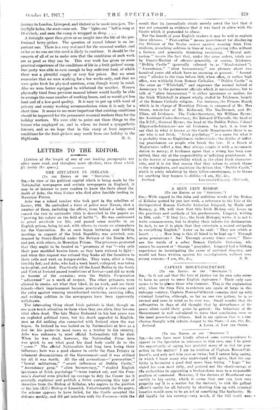LETTERS TO THE EDITOR.
[Letters of the length of one of our leading paragraphs are often snore read, and therefore more effective, than those which fill treble the spare.]
THE SITUATION IN IRELAND.
[To THE EPH703 OP ran SPECTATOR."]
Sw,—In view of the political capital which is being made by the Nationalist newspapers and certain newspapers in England, it may he of interest to your readers to know the facts about the death of Ashe, the Sinn Feiner who died after forcible feeding iu Mountjoy Prison.
Ashe was a school teacher who took part in the rebellion of Easter, 1916. Ile ambushed a force of police near Navan, shot a number of them, including the officer, from behind a hedge, and caused the rest to surrender (this is described in the papers us "proving his valour on the field of battle"). He was condemned to penal servitude for life, and passed some months iu an English prison, being let out, with others, to create an atmosphere for the Convention. He at once began lecturing and holding meetings in support of the Irish Republic; HAS arrested, con- demned by Court-Martial tinder the Defence of the Realm Acts, and put, with others, in Mountjoy Prison. The prisoners protested that they ought to be treated as " prisoners of war "—why only their poor muddled brains know, as they have refused to fight— and when this request was refused they broke all the furniture in their cells and went on hunger-strike. They were, after a time, forcibly fed; and Ashe, who had a weak heart, collapsed, was taken to hospital, and died. Practically all the Local Bodies in the South and West of Ireland passed resolutions of horror—and did no work in honour of the occasion; even the Dublin Corporation " adjourned " as a mark of respect. The other prisoners were allowed to smoke, eat what they liked, do no work, and see their friends—their imprisomnent became practically a rest-cure; and the rules against wearing unauthorized uniforms, carrying rifles, and writing sedition in the newspapers have been apparently withdrawn.
The interesting Thing about Irish patriots is that, though no one pays much attention to them when they are olive, they become vital when dead. The late Major Redmond in his last years was an exploded political force, but his death appealed to English. men as did nothing else connected with Ireland since the war began. In Ireland he was looked on by Nationalists at best an 11. fool for his pains—in most cases as e traitor to his country. Ashe was unknown to most official Nationalists till he died. When he was dead, however, the Nationalist Press here was quick to see what good his dead body could do to the "cause." The official Nationalists had long been losing their influence; here was a good chance to outdo the Stun Milers in vehement denunciations of the Government—and it was utilized for all it was worth. All the old accusations—" provocation." "brutal militarism," "secret influences of Dublin Castle," "Ascendancy gang," "alien bureaucracy," "studied English ignorance of Irish psychology "—were trotted out, and the Free- man's Alumni even plucked up courage to defy the Censor (as it carefully explains) and publish a letter containing this type of invective from the Bishop of ICillaloe, who aspires to the position of the late (R.C.) Bishop of Limerick. Unfortunately for the paper, the scheme appears to have failed, for the Castle accepted the defiance-meekly, and did not interfere with the Freeman—with the
result that its journalistic rivals merely noted the fact that it was not censored as evidence that it was hand in glove with the Castle which it pretended to abuse.
For the benefit of your English readers it may he well to explain these phrases. "Provocation" menus punishment for disobeying the Defence of the Realm orders against wearing Sinn Fein uniform, preaching sedition in time of war, carrying rifles without a licence, and generally hiuderilig remolding. "Brutal mili- turisw" means the fact that, under the same orders. trials are by Courts-Martial of officers—generally, of course, Irishmen. "Dublin Castle" (generally referred to as " blood-stnined "I. " Ascendancy," " alien bureaucracy," are phrases about two hundred years old which have no meaning at present. " Aseeed- ones. " alludes to the time before 1620, when office, or rather high
office, was withheld from Ronnie Catholics. "Dublin Castle" is the sane as " Whitehall," and expresses the normul hatred of
democracy to the permanent officials which it necessitates; but to talk of " alien bureaucracy" is either ignorance or malice, for the Irish Whitehall is almost wholly staffed by Irishmen. largely of the Roman Catholic religion. For instance, the Prisons Board, which is in charge of Mountjoy Prison, is composed of Mr. Max Green, son-in-law of Mr. Redmond, The MaeDermot, and Dr. Flinn, all Irishmen. The Under-Secretory, Sir William Byrne: the Assistant-Under-Secretary, Sir Edward O'Farrell; the head of the R.I.C., General Byrne; the head of the Dublin Police, Colo el Edgeworth-Johnstone—are ell Irishmen. In fact, it is true to say that in what is known as the Castle Departments there in HO one who is not Irish. "Irish psychology " is a name for what it is probably true HO Englishman understands: the dislike of inflict- ing punishment on people who break the law. If a Bench of
Magistrates inflict a fine, they always couple it with a recommen- dation to merry; if Irishmen agree that a wrong has been com- mitted, they shy at the responsibility of inflicting punishment. H is the horror of responsibility which is the chief Irish churucter- istic, and it in for that reason that they refuse to attach blame to the wrongdoers, and maintain the fiction that "Dublin Castle," which is solely inhabited by their fellow-countrymen, is to blame for anything they happen to dislike.—I am, Sir, de.,


































 Previous page
Previous page